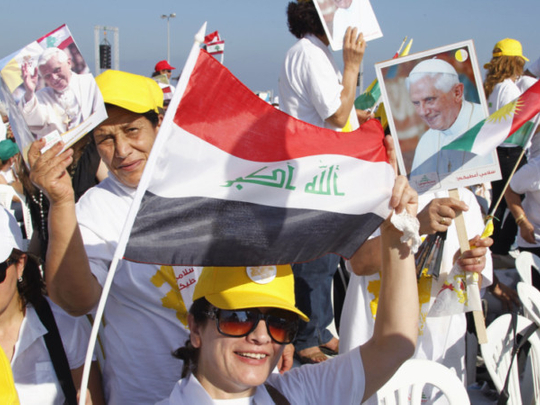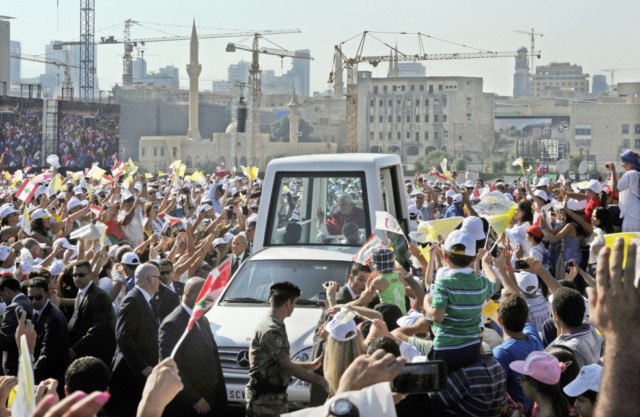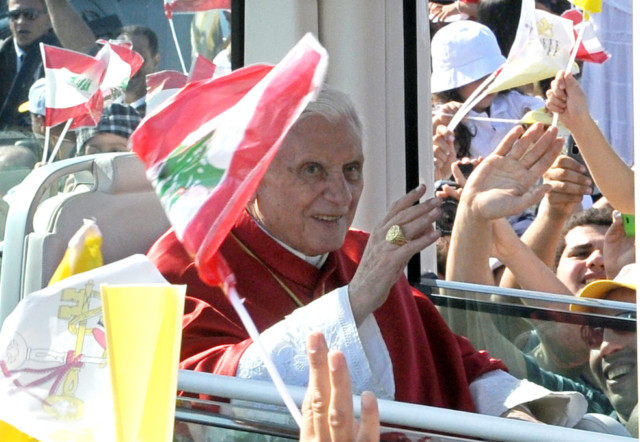
BEIRUT: Pope Benedict XVI prayed on Sunday that Middle East leaders work toward peace and reconciliation, stressing again the central theme of his visit to Lebanon, whose neighbour Syria is engulfed in a civil war.
“In a world where violence constantly leaves behind its grim trail of death and destruction, to serve justice and peace is urgently necessary,” Benedict said in his homily at an open-air mass on Beirut’s waterfront.
“I pray in particular that the Lord will grant to this region of the Middle East servants of peace and reconciliation, so that all people can live in peace and with dignity,” he added.
An estimated 350,000 people were gathered under a bright warm sun to join the pontiff as he celebrated a solemn mass on the final day of his three-day visit to Lebanon.
In his homily, the pope said service is key to the practice of a Christian life, noting that Jesus Christ came into into the world not to be a powerful political leader, but a servant.
“Service is a foundational element of the identity of Christ’s followers. The vocation of the Church and of each Christian is to serve others, as the Lord himself did, freely and impartially.”
On Saturday, the frail, 85-year-old pontiff urged Middle Eastern Christians and Muslims to forge a harmonious, pluralistic society in which the dignity of each person is respected and the right to worship in peace is guaranteed.
Those who desire to live in peace must have a change of heart, Benedict said, which involves “rejecting revenge, acknowledging one’s faults, accepting apologies without demanding them and, not least, forgiveness”.
He said the universal yearning of humanity for peace can only be realised through community, comprising individual persons, whose aspirations and rights to a fulfilling life are respected.
Lebanon is a multi-faith country in which Muslims make up about 65 per cent of the population and Christians the balance.
The pope came with a message of peace and reconciliation to Lebanon and to the wider Middle East, which have been torn by violence, often sectarian, over the years.
He said the conditions for building and consolidating peace must be grounded in the dignity of man.
Poverty, unemployment, corruption, addiction, exploitation and terrorism “not only cause unacceptable suffering to their victims but also a great impoverishment of human potential. We run the risk of being enslaved by an economic and financial mindset, which would subordinate ‘being’ to ‘having’.”
Without pointing fingers, he said “some ideologies undermine the foundations of society. We need to be conscious of these attacks on our efforts to build harmonious coexistence”.
Benedict noted that Christians and Muslims have lived side by side in the Middle East for centuries and that there is room for a pluralistic society.
‘Two religions within the same family’
“It is not uncommon to see the two religions within the same family. If this is possible within the same family, why should it not be possible at the level of the whole of society?
“The particular character of the Middle East consists in the centuries-old mix of diverse elements. Admittedly, they have fought one another, sadly that is also true. A pluralistic society can only exist on the basis of mutual respect, the desire to know the other and continuous dialogue.”
Central to that, the freedom “to profess and practise one’s religion without danger to life and liberty must be possible to everyone.”
Echoing his words Lebanon’s Sunni mufti, or spiritual leader, Mohammad Rashid Kabbani, said the events rocking the Arab world “bring us Muslims and Christians a light that shows us the path to a better tomorrow, though they also bring many dangers that are a threat to us.
“But just as we made our history together in the past, we will also make our future together, based on coexistence.”












